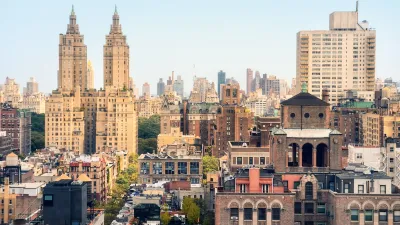Washington D.C. is embarking on the first update to its zoning code since 1958. In advance of consideration by the city's Zoning Commission next spring, controversy has erupted around - you guessed it - parking!
After four years of development, as city planners prepare to hold a series of community meetings to discusss what planning director Harriet Tregoning says are modest changes to the city's 54-year-old zoning code, proponents and opponents of the changes are staking out their positions, reports Mike DeBonis. The most notable changes would allow corner stores and accessory dwellings, set sustainability targets for commercial buildings, and eliminate minimum parking requirements in “transit zones.”
"Planners say the changes are necessary to shape a growing city, one that could see hundreds of thousands of new residents in coming decades as congestion fouls automobile commutes, energy prices rise and environmental considerations become more urgent," says DeBonis. "Detractors fear that the changes will dramatically change the character, or at least the car-centric way of life, in outlying residential neighborhoods."
"Linda Schmitt, a Chevy Chase resident who is organizing opposition to the rewrite, said the changes could alarm residents who chose their neighborhoods with particular expectations."
“You put down your life savings, you pony up the mortgage, you take care of your property, you fix the roof, you try to be a good neighbor . . . and all of a sudden somebody wants to turn the apple cart over,” she said. “Who asked us if this was something we wanted? We don’t want this.”
“I’m just looking for more balance in our transportation system,” Tregoning said, in defense of the modifications. “A resilient city is a city that gives people choices, and increasingly people want those choices.”
FULL STORY: D.C. zoning revamp stokes residents’ fears about changing city

Alabama: Trump Terminates Settlements for Black Communities Harmed By Raw Sewage
Trump deemed the landmark civil rights agreement “illegal DEI and environmental justice policy.”

Study: Maui’s Plan to Convert Vacation Rentals to Long-Term Housing Could Cause Nearly $1 Billion Economic Loss
The plan would reduce visitor accommodation by 25% resulting in 1,900 jobs lost.

Planetizen Federal Action Tracker
A weekly monitor of how Trump’s orders and actions are impacting planners and planning in America.

Passengers Flock to Caltrain After Electrification
The new electric trains are running faster and more reliably, leading to strong ridership growth on the Bay Area rail system.

Texas Churches Rally Behind ‘Yes in God’s Back Yard’ Legislation
Religious leaders want the state to reduce zoning regulations to streamline leasing church-owned land to housing developers.

Grand Rapids Mayor Proposes Garage Conversion Plan
The mayor says allowing homeowners to convert garages to dwelling units could alleviate the city’s housing shortage.
Urban Design for Planners 1: Software Tools
This six-course series explores essential urban design concepts using open source software and equips planners with the tools they need to participate fully in the urban design process.
Planning for Universal Design
Learn the tools for implementing Universal Design in planning regulations.
Caltrans
Smith Gee Studio
Institute for Housing and Urban Development Studies (IHS)
City of Grandview
Harvard GSD Executive Education
Toledo-Lucas County Plan Commissions
Salt Lake City
NYU Wagner Graduate School of Public Service





























